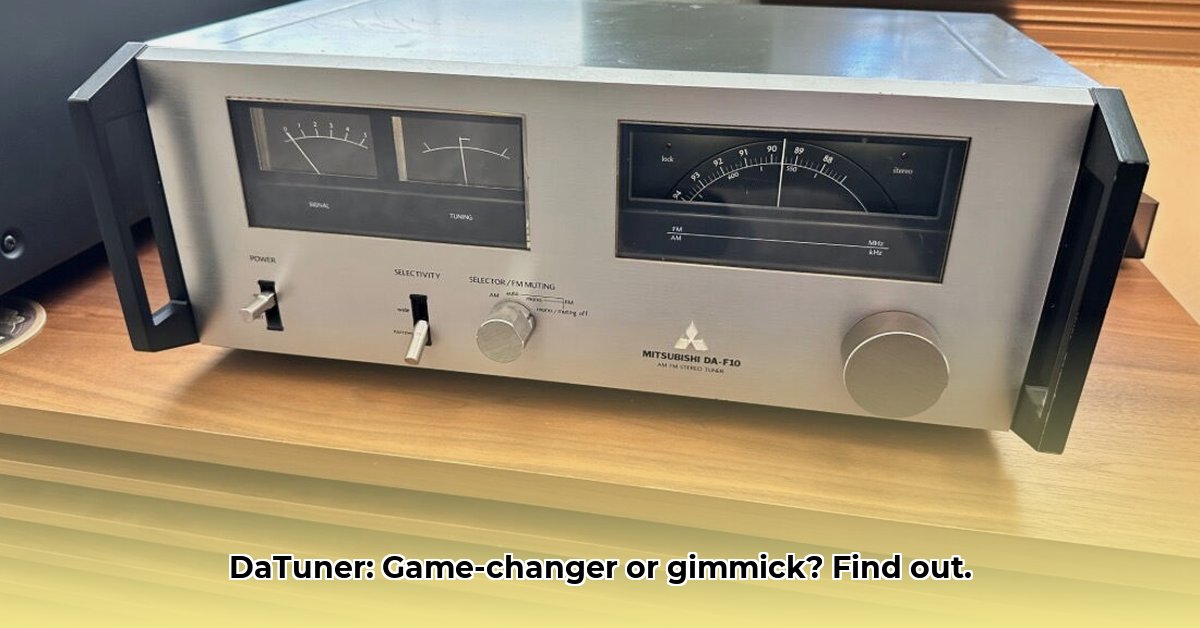
Picking the right digital tuner can significantly impact a musician's workflow. This review delves into DaTuner, comparing it to Musicca to help you choose the best option. We'll explore DaTuner's features, provide practical usage tips, and highlight its strengths and weaknesses. Whether you're a beginner or a seasoned professional, this comparative review will guide your decision-making process.
DaTuner: A Detailed Examination
DaTuner has gained popularity among musicians, but does it live up to the hype? This section examines its core features and functionality.
Accuracy and Reliability
Accuracy is paramount for any tuner. DaTuner promotes its "no dead zone" feature, suggesting reliable readings even with slightly off-pitch notes. While this is a significant claim, independent verification is needed for definitive confirmation. In contrast, Musicca's accuracy specifications are less detailed, hindering a direct, quantitative comparison. Ultimately, the best tuner consistently provides accurate pitch readings.
Advanced Features: Beyond Basic Tuning
DaTuner PRO offers advanced features exceeding basic tuning capabilities. Its strobe tuner (a highly precise visual tuning method) is invaluable for musicians seeking ultimate accuracy. The inclusion of temperament adjustments (fine-tuning intervals affecting the overall sound) further enhances its capabilities, a feature often absent in simpler alternatives like Musicca. These advanced tools cater to musicians prioritizing precision and control over their instrument's intonation.
User Interface and Experience
User experience plays a crucial role in a tuner's usability. DaTuner generally boasts an intuitive interface, although individual experiences may vary. The app's menus and controls should be user-friendly for both novice and expert musicians. A poorly designed interface can negatively impact workflow, so testing the free version before committing to the PRO version is recommended.
DaTuner vs. Musicca: A Comparative Analysis
This head-to-head comparison highlights the key differences between DaTuner and Musicca:
| Feature | DaTuner (Free/PRO) | Musicca (Online) | Notes |
|---|---|---|---|
| Basic Tuning | Yes | Yes | Essential for any tuner. |
| Strobe Tuner | PRO only | No | Offers extremely precise tuning, ideal for professional musicians. |
| Temperament Adjustment | PRO only | No | Fine-tunes intervals for a refined and nuanced tonal quality. |
| Multiple Notations | Yes | Information unclear | Supports various tuning systems (e.g., equal temperament, just intonation). |
| Offline Functionality | Yes | No | Crucial for live performances or areas with unreliable internet connectivity. |
Offline Accessibility and Cross-Platform Compatibility
Offline functionality distinguishes DaTuner from Musicca. DaTuner's offline capabilities are critical for live performances or situations with limited internet access. Conversely, Musicca, being web-based, necessitates a consistent internet connection, which could prove problematic in certain scenarios. The reliance on a stable internet connection for Musicca significantly impacts its suitability for live performance use.
Choosing the Right Chromatic Tuner App: Recommendations
Selecting the optimal tuner depends on individual needs. Casual users might find a basic, free tuner sufficient. However, serious musicians who require precision, advanced features, and offline accessibility will likely benefit most from DaTuner PRO. The investment in the PRO version justifies its cost through enhanced capabilities. Consider your specific workflow and requirements when making your decision. Remember, the best tuner is the one that perfectly aligns with your needs and enhances your musical experience.
How to Choose the Best Chromatic Tuner App for Android
Choosing the right chromatic tuner app for your Android device requires careful consideration. The market offers a wide variety of options, each possessing unique strengths and weaknesses.
DaTuner: A Closer Look
DaTuner stands out for its accuracy and clean user interface. Many users appreciate its responsiveness and reliability. However, it lacks additional features such as a metronome, found in competitor apps. This minimalist approach may be optimal for some, a drawback for others. The core question is: Do you prioritize a simple, accurate tuner or an all-in-one music app?
DaTuner vs. Musicca: A Feature Comparison
This comparison illustrates the key differentiators between DaTuner and Musicca for the Android platform:
| Feature | DaTuner | Musicca |
|---|---|---|
| Accuracy | High | Moderate |
| Features | Basic (tuning only) | Extensive (metronome, transcription, etc.) |
| User Interface | Simple, clean | More complex, feature-rich |
| Price | (Check app store for current pricing) | (Check app store for current pricing) |
Factors to Consider When Choosing Your Tuner App
The best chromatic tuner app is subjective. Personal needs significantly impact the decision-making process:
- Accuracy Requirements: Do you need pinpoint accuracy, or is a reasonable approximation sufficient?
- Feature Set: In addition to basic tuning, do you need features like a metronome or recording capabilities?
- User-Friendliness: Do you prefer a simple, intuitive interface or a more complex app?
- Budget: Many free tuners are available, while paid apps often offer enhanced features or superior accuracy.
To make the most informed decision, experiment with free options and consider paid apps based on your individual needs and preferences. Refer to user reviews and consult expert opinions to facilitate your selection process.
⭐⭐⭐⭐☆ (4.8)
Download via Link 1
Download via Link 2
Last updated: Sunday, June 08, 2025